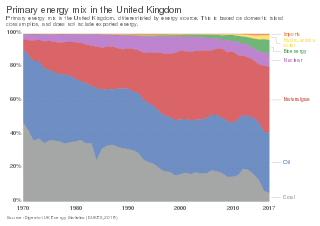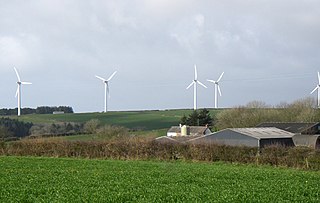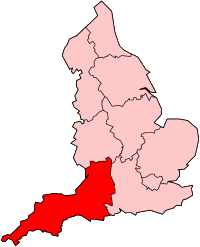
The National Grid is the high-voltage electric power transmission network serving Great Britain, connecting power stations and major substations, and ensuring that electricity generated anywhere on the grid can be used to satisfy demand elsewhere. The network serves the majority of Great Britain and some of the surrounding islands. It does not cover Northern Ireland, which is part of the Irish single electricity market.
The Renewables Obligation (RO) is designed to encourage generation of electricity from eligible renewable sources in the United Kingdom. It was introduced in England and Wales and in a different form in Scotland in April 2002 and in Northern Ireland in April 2005, replacing the Non-Fossil Fuel Obligation which operated from 1990.

The Office of Gas and Electricity Markets (Ofgem), supporting the Gas and Electricity Markets Authority (GEMA), is the government regulator for the electricity and downstream natural gas markets in Great Britain. It was formed by the merger of the Office of Electricity Regulation (OFFER) and Office of Gas Supply (Ofgas).

The energy policy of the United Kingdom refers to the United Kingdom's efforts towards reducing energy intensity, reducing energy poverty, and maintaining energy supply reliability. The United Kingdom has had success in this, though energy intensity remains high. There is an ambitious goal to reduce carbon dioxide emissions in future years, but it is unclear whether the programmes in place are sufficient to achieve this objective. Regarding energy self-sufficiency, UK policy does not address this issue, other than to concede historic energy security is currently ceasing to exist.
E.ON UK is a British energy company and one of the largest suppliers of energy in the UK, following its acquisition of Npower. It is a subsidiary of E.ON of Germany and one of the Big Six energy suppliers. It was founded in 1989 as Powergen, and was listed on the London Stock Exchange and was once a constituent of the FTSE 100 Index. It has been a subsidiary of E.ON since 1 July 2002.
Ecotricity is a British energy company based in Stroud, Gloucestershire, England, specialising in selling green energy to consumers that it primarily generates from its 87.2 megawatt wind power portfolio. It is built on the principle of heavily reinvesting its profit in building more of its own green energy generation.

Solar power represented a very small part of electricity production in the United Kingdom until the 2010s when it increased rapidly, thanks to feed-in tariff (FIT) subsidies and the falling cost of photovoltaic (PV) panels.

The availability and uptake of green electricity in the United Kingdom has increased in the 21st century. There are a number of suppliers offering green electricity in the United Kingdom. In theory these types of tariffs help to lower carbon dioxide emissions by increasing consumer demand for green electricity and encouraging more renewable energy plant to be built. Since Ofgem's 2014 regulations there are now set criteria defining what can be classified as a green source product. As well as holding sufficient guarantee of origin certificates to cover the electricity sold to consumers, suppliers are also required to show additionality by contributing to wider environmental and low carbon funds.

Renewable energy in the United Kingdom contributes to production for electricity, heat, and transport.
In the United Kingdom, an electricity supplier is a retailer of electricity. For each supply point the supplier has to pay the various costs of transmission, distribution, meter operation, data collection, tax etc. The supplier then adds in energy costs and the supplier's own charge. Regulation of the charging of customers is covered by the industry regulator Ofgem.

OVO Energy is a major energy supplier based in Bristol, England.

100Green, previously known as Green Energy UK, is an independent sustainable energy company that provides 100% Ofgem-certified renewable electricity and gas to homes, businesses and organizations across England, Wales and Scotland. 100Green stands out as the only energy supplier in the UK to offer 100% green gas. The company was founded in 2001 by CEO Douglas Stewart and is located in Ware, Hertfordshire.
A feed-in tariff (FIT) is paid by energy suppliers in the United Kingdom if a property or organisation generates their own electricity using technology such as solar panels or wind turbines and feeds any surplus back to the grid. The FIT scheme entered into law by the Energy Act 2008 and took effect from April 2010. The scheme closed to new applicants on 31 March 2019.
The Big Six were the United Kingdom's largest retail suppliers of gas and electricity, who dominated the market following liberalisation in the late 1990s. By 2002, six companies – British Gas, EDF Energy, E.ON, RWE npower, Scottish Power and SSE – had emerged from the 15 former incumbent monopoly suppliers.
Juliet Davenport OBE is a British businesswoman. She founded and is the former chief executive of Good Energy, a renewable energy company in the United Kingdom.

Solarplicity Energy Limited was a renewable energy company based in Hertfordshire, England. In August 2019 the company became the 13th energy supplier to collapse since 2018, affecting around 7,500 domestic and 500 business customers.

Our Power was an energy supply company backed by the Scottish government, one of the first in the UK to operate on a non-profit distribution basis. Our Power was entirely asset-locked, being owned by social housing providers, community organisations and local authorities.

Bristol Energy was a municipally owned energy supply company, founded in September 2015 by Bristol City Council. Its business accounts were sold to Yü Energy in August 2020, and in the following month its residential accounts were sold to Together Energy. In October 2020, F&S Energy purchased Bristol Energy's renewable energy generator portfolio, along with its commercial feed-in tariff customers.

Bulb Energy Ltd., trading as Bulb, was an energy supply company in the United Kingdom acquired by Octopus Energy in 2022. Founded in 2013, the company attracted venture capital from DST Global and Magnetar Capital and ran at a financial loss while achieving rapid growth in customers. Bulb claimed to provide electricity and gas from renewable or off-set sources. As of November 2021, it had a share of approximately 5-6% of the UK energy market and was considered the seventh largest in the country.
Octopus Energy Group is a British renewable energy group specialising in sustainable energy. It was founded in 2015 with the backing of British fund management company Octopus Group, a British asset management company. Headquartered in London, the company has operations in the United Kingdom, France, Germany, Italy, Spain, Australia, Japan, New Zealand and the United States. Following the acquisition of Shell Energy on 1 December 2023, Octopus Energy is the UK's second largest domestic energy provider.













